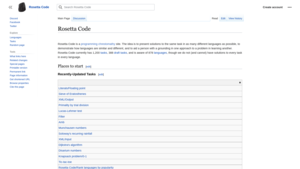


Front page of rosettacode.org
| |
| Available in | English |
|---|---|
| Owner | Michael Mol[1] |
| URL | www |
| Launched | January 1, 2007; 17 years ago (2007-01-01) |
| Current status | Online |
Content license | GFDL |
| Written in | PHP, MediaWiki |
Rosetta Code is a wiki-based programming chrestomathy website with implementations of common algorithms and solutions to various programming problems in many different programming languages.[2][3] It is named for the Rosetta Stone, which has the same text inscribed on it in three languages, and thus allowed Egyptian hieroglyphs to be deciphered for the first time.[1]
Rosetta Code was created in 2007 by Michael Mol.[1] The site's content is licensed under the GNU Free Documentation License 1.2, though some components may be dual-licensed under more permissive terms.[4]
The Rosetta Code web repository illustrates how desired functionality is implemented very differently in various programming paradigms,[5][6] and how "the same" task is accomplished in different programming languages.[7]
As of 22 February 2024[update], Rosetta Code has:[8]
In August 2022, Rosetta Code migrated from independent hosting to Miraheze.
Presently, Rosetta Code is hosted by WikiTide.[9]
The Rosetta Code site is organized as a browsable cross-section of tasks (specific programming problems or considerations) and computer programming languages.[3] A task's page displays visitor-contributed solutions in various computer languages, allowing a viewer to compare each language's approach to the task's stated problem.
Task pages are included in per-language listings based on the languages of provided solutions; a task with a solution in the C programming language will appear in the listing for C. If the same task has a solution in Ruby, the task will appear in the listing for Ruby as well.
Some of the computer programming languages found on Rosetta Code (which have Wikipedia descriptions) include: [10]
A complete list of the computer programming languages that have examples (entries/solutions to the Rosetta Code tasks) is available.[11]
Some of the tasks found on Rosetta Code include:[12]
{{cite book}}: |website= ignored (help)